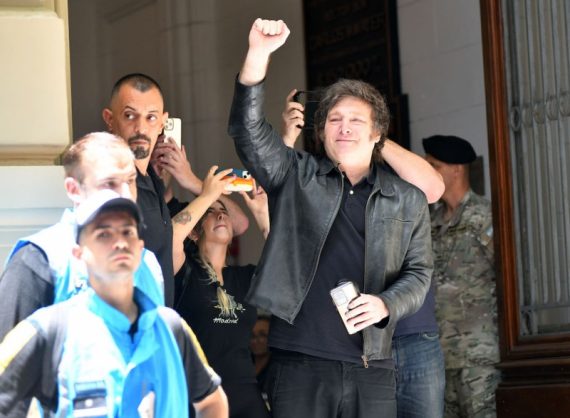A
rgentine labor leaders have expressed staunch opposition to the newly elected President Javier Milei’s proposed economic reforms, which include significant privatizations and a reduction in public spending. Milei’s victory, with a larger than expected margin, has sparked concerns among unions and social organizations that fear the impact on the country’s workforce and public services.
Milei, known for his dramatic campaign demonstrations, including wielding a chainsaw, has called for radical actions to revive Argentina’s stagnant economy, which is currently battling an annual inflation rate of 140%. His post-election comments indicate a strong shift towards privatization, suggesting that “everything that can be in the hands of the private sector will be,” including state-owned media, oil and gas companies, water distribution, and train services.
Union leaders, led by Héctor Dear, the secretary general of the General Confederation of Labor, are closely monitoring Milei’s statements. Dear emphasized the labor movement’s focus on job creation and production, countering Milei’s plans which they believe could lead to economic cuts and job losses.
Privatization of the state-owned Aerolineas Argentinas
Pablo Biró, head of the Airline Pilots Association, made a fiery proclamation against Milei’s intention to privatize the state-owned Aerolineas Argentinas, signaling a potential for intense labor conflict.
While some union leaders advocate a cautious approach, awaiting Milei’s implementation of policies, others, like Daniel Catalano from the State Workers’ Association, have declared immediate resistance, aligning with human rights groups like the Mothers of Plaza de Mayo in symbolic opposition.
Concerns also extend to human rights organizations that foresee potential setbacks in policies that have enabled the prosecution of crimes against humanity during Argentina’s military dictatorship. Leftist social organizations are planning to mobilize against austerity measures, indicating a turbulent road ahead for the incoming government.
Significant social protest?
Analyst Nicolás Saldías predicts that Milei’s quick action on privatizations could trigger significant social protest, as labor unions are well-prepared to mobilize against policies they view as detrimental. Argentina’s robust tradition of labor union activism, known for its impactful strikes and roadblocks, suggests that the country may be on the verge of a period of heightened civil unrest.
President-elect Milei has acknowledged the likelihood of protests and has vowed to enforce the law without succumbing to pressure. With a history of volatile responses to protests, including fatalities, Argentine law enforcement may face challenges in maintaining order without exacerbating tensions.
As Argentina prepares for Milei’s tenure beginning in December, the nation watches with apprehension, anticipating the potential consequences of his administration’s controversial policies on the fabric of Argentine society.
Sources: ABC News and AP
Recommended





